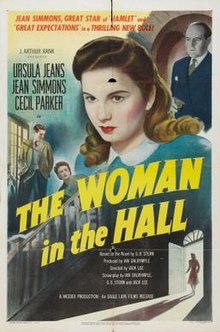The Woman in the Hall
| The Woman in the Hall | |
|---|---|
 | |
| Directed by | Jack Lee |
| Written by | Ian Dalrymple (screenplay) G. B. Stern (novel and screenplay) Jack Lee (screenplay) |
| Produced by | Ian Dalrymple |
| Starring | Ursula Jeans Jean Simmons Cecil Parker |
| Cinematography | C.M. Pennington-Richards |
| Edited by | John Krish |
| Music by | Temple Abady |
Production company | Wessex Film Productions |
| Distributed by | General Film Distributors |
Release date | 28 October 1947 |
Running time | 93 minutes |
| Country | United Kingdom |
| Language | English |
The Woman in the Hall is a 1947 British drama film, directed by Jack Lee, with a screenplay by Jack Lee, Ian Dalrymple and Gladys Bronwyn Stern, from Stern's novel. It was released in 1947. "A studio bound melodrama, it seems atypical of Lee's later films, but the struggles of an individual to achieve a goal and through that struggle develop into a better person was a recurrent theme." The film features the screen debut of future television star Susan Hampshire.
It was made at Pinewood Studios, with sets designed by Peter Proud.
Plot
Lorna Blake (Ursula Jeans) is a widow with two daughters. She augments her slender income by using her children to extort money, visiting the houses of the rich to tell a pathetic story and beg for help.
Lorna makes a rich capture when Sir Halmar Bernard (Cecil Parker) proposes marriage to her. She tells him that she has only one daughter, Molly (Jill Freud, credited as Jill Raymond). When her other daughter, Jay (Jean Simmons), is arrested for forging a cheque, Lorna refuses to help her.
Cast
- Ursula Jeans as Lorna Blake
- Jean Simmons as Jay
- Cecil Parker as Sir Halmar
- Martin Walker as Judge
Production
Jack Lee later recalled the experience of working for Wessex "revolted me" because "it reminded me of when I was a child and my mother would send me out on begging expeditions because she never had any money. It was a bloody awful novel and a terrible film."[1]
References
- ^ Brian MacFarlane, An Autobiography of British Cinema, Methueun 1997 p 356
External links
- The Woman in the Hall at IMDb
- Jack Lee at the BFI's Screenonline
